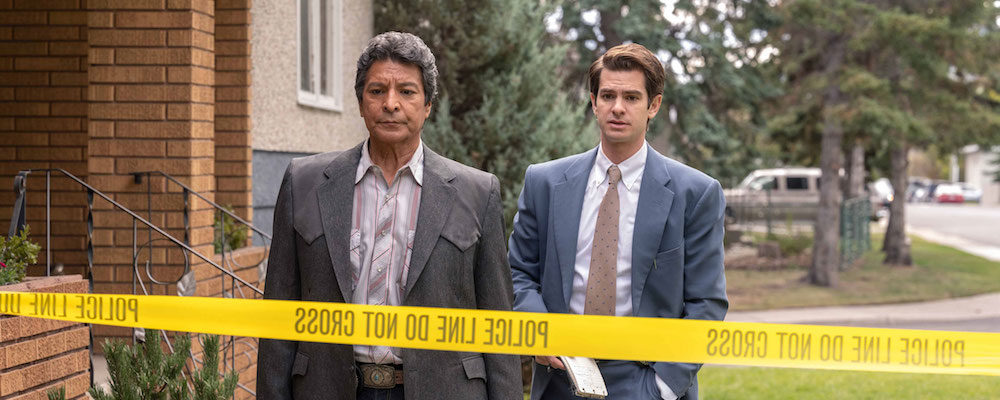‘Under the Banner of Heaven’ Recounts a Disturbing True Story of Faith and Murder
Alci Rengifo
FX on Hulu’s “Under the Banner of Heaven” tells a different kind of true crime story. Its reach is quite broad as it recounts a 1984 murder that somehow connects to the wider history of Mormonism. The Church of Jesus Christ of Latter-day Saints (LDS), the only faith of its kind of truly American origin, is not readily associated with murder driven by fanaticism. This is why this seven-part limited series sustains a unique fascination even when it goes for the familiar detective story devices oversaturating so much TV. Creator Dustin Lance Black takes inspiration from a nonfiction bestseller by Jon Krakauer, a writer of fine details. The challenging balance in style and narrative her consists of detailing the crime, while delving into spiritual realms of thought.
Andrew Garfield plays Detective Jeb Pyre, who is also a devout Mormon in Salt Lake Valley, Utah. A quiet evening at home with his wife and two young daughters is interrupted by a call to a crime scene. Jeb arrives at a house where a woman named Brenda Lafferty (Daisy Edgar-Jones) and her daughter have been brutally killed. Her husband, Allen (Billy Howle), appears on the scene disheveled. Jeb and his older partner, Detective Bill Taba (Gil Birmingham), begin interrogating Allen to get some answers. To Jeb’s shock, not only does Allen deny culpability for the murders, he basically accuses other LDS members of having committed the crime. He also fears for the safety of his brothers. Allen then begins recounting his marriage to Brenda and how he brought her into the circle of his family. The Laffertys are a respected Mormon clan in Utah, headed by patriarch Ammon (Christopher Heyerdahl), who maintains a strict code of conduct. Allen had recently left the LDS, and believes his dissent might have triggered a vicious response.
Krakauer’s book was published in 2003 but like many great works of investigative reporting, it maintains a striking relevance. We tend to associate themes of religious fanaticism and violence with societies beyond the United States, when we easily have plenty of religious fanatics here at home. There is a renewed, growing tension between secularism and an entrenched, religious conservatism. “Under the Banner of Heaven” focuses on a specific case involving Utah’s Mormon community while in a broader way, it’s about how powerful enclosed belief systems can inspire extreme actions anywhere. The two detectives journeying into the case are themselves stand-ins for the viewpoints at play here. Jeb is the clean-cut, conservative Mormon who is so nice and naïve we wonder how he’s even a detective. Bill Taba is both Native American and non-religious, so he’s skeptical about Mormon piety, especially in such a predominantly white community like Salt Lake Valley. Black is never attacking Mormonism or religious belief. He’s simply asking hard questions through this story about how far indoctrination can lead individuals.
Rarely has a detective series posed such deep questions involving theology and social conditioning. The themes make up for the overlong running time of episodes or the somewhat clunky editing choices. Black wants to keep some of the structure of Krakauer’s book in how the author would switch between the case and the older, controversial history of the Mormons, including founder Joseph Smith. Allen reveals how he met Brenda and introduced her to his family, who could be a bit condescending at her artistic aspirations and lightly rebellious nature. Such memories are contrasted with historical scenes set in the 1800s recounting Joseph Smith’s own struggles with wanting to marry a girl from a disapproving family. The Lafferty family, described as “Utah Kennedys,” viewed themselves as such pure Mormons, that they tended to even raise their noses at Brenda attending BYU, the prestigious LDS university. For Ammon such city folk hinted at decadence or corruption. Other important supporting players, and there are many, include Allen’s brothers, Jacob (Taylor St. Pierre) and Ron (Sam Worthington). Compared to Allen, Jacob and Ron were more rugged and flirtatious, even with their wives around. If the show develops into the darker contours of the book, we’ll also get an exploration of breakaway Mormons still doing polygamy, despite the official church disavowing the practice. Black knows the terrain well since he was once a staff writer on HBO’s acclaimed Mormon drama, “Big Love.”
Stylistically “Under the Banner of Heaven” can become slightly uneven, since the 1984 moments, which are more compelling, have the atmosphere of a David Fincher film and the 1800s scenes feel like standard historical recreations, which we don’t necessarily need. Sometimes the material gets ahead of itself by suddenly referencing an infamous Mormon massacre in the pilot without strong context. We get enough useful information on Mormon culture from Jeb, who guides Bill through the terminology, social norms and codes that are inherent to any religious community. This is also what gives the case its more unique sense of conflict. Jeb is so devout he will pray in his office during a moment of profound confusion. He is so secure in his faith that the experience of coming across the Lafferty case can be shattering. Brenda’s murder is not just a random crime, but one directly linked to the detective’s belief system, even justified by it according to the killers. Many faiths and ideologies face this kind of challenge when devotees go rogue. How much can be blamed on the faith’s theology? Black has chosen the perfect format for a thriller of such scope. “Under the Banner of Heaven” asks for attention and patience, but with a story worth pursuing for its meaning.
“Under the Banner of Heaven” begins streaming April 28 with new episodes premiering Thursdays on FX on Hulu.

